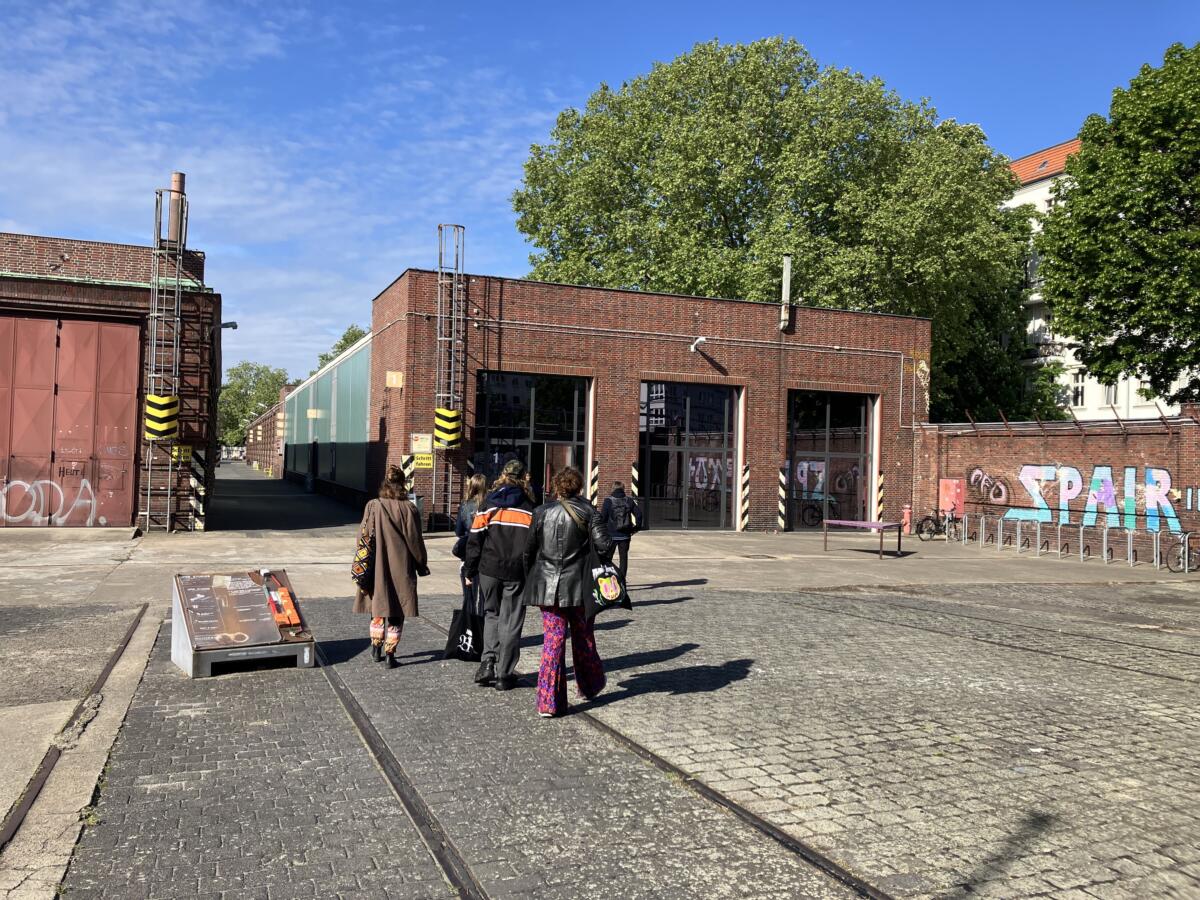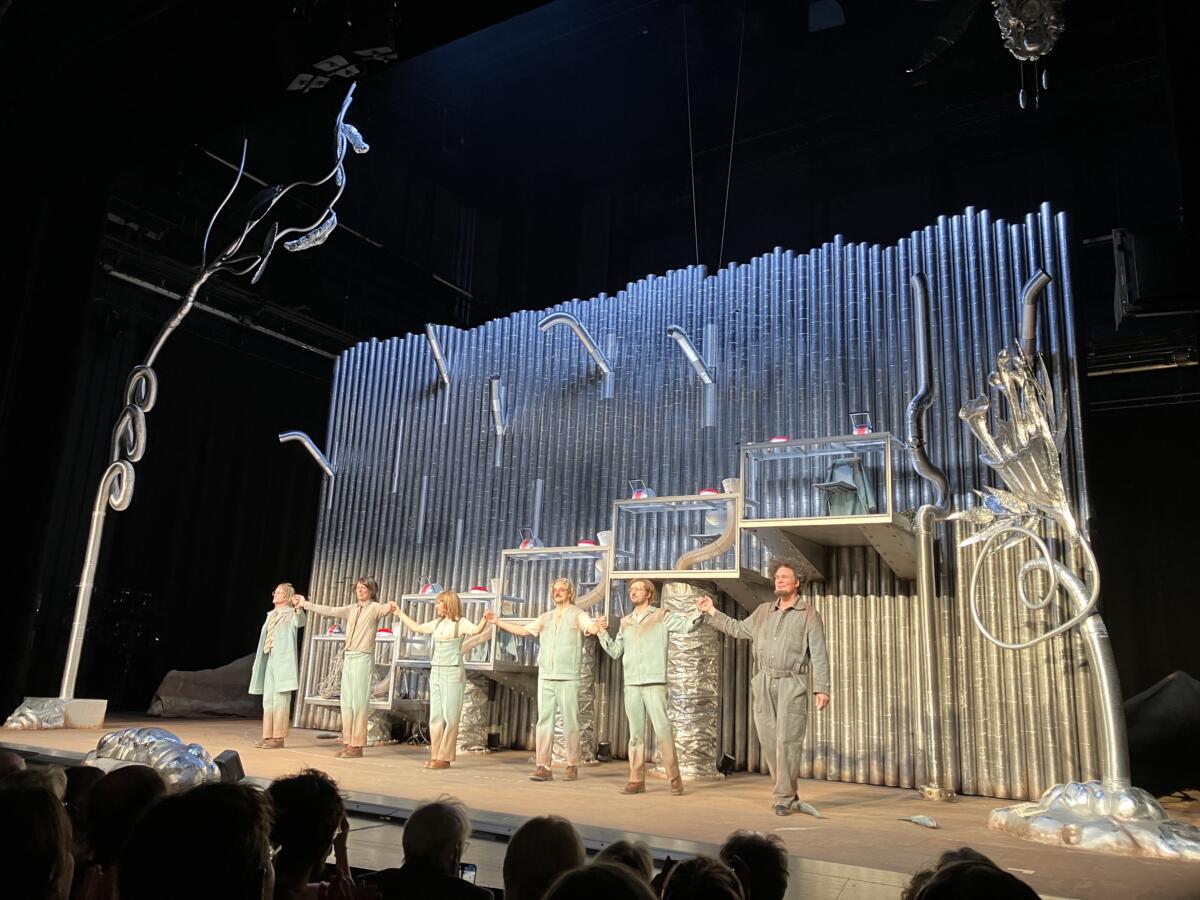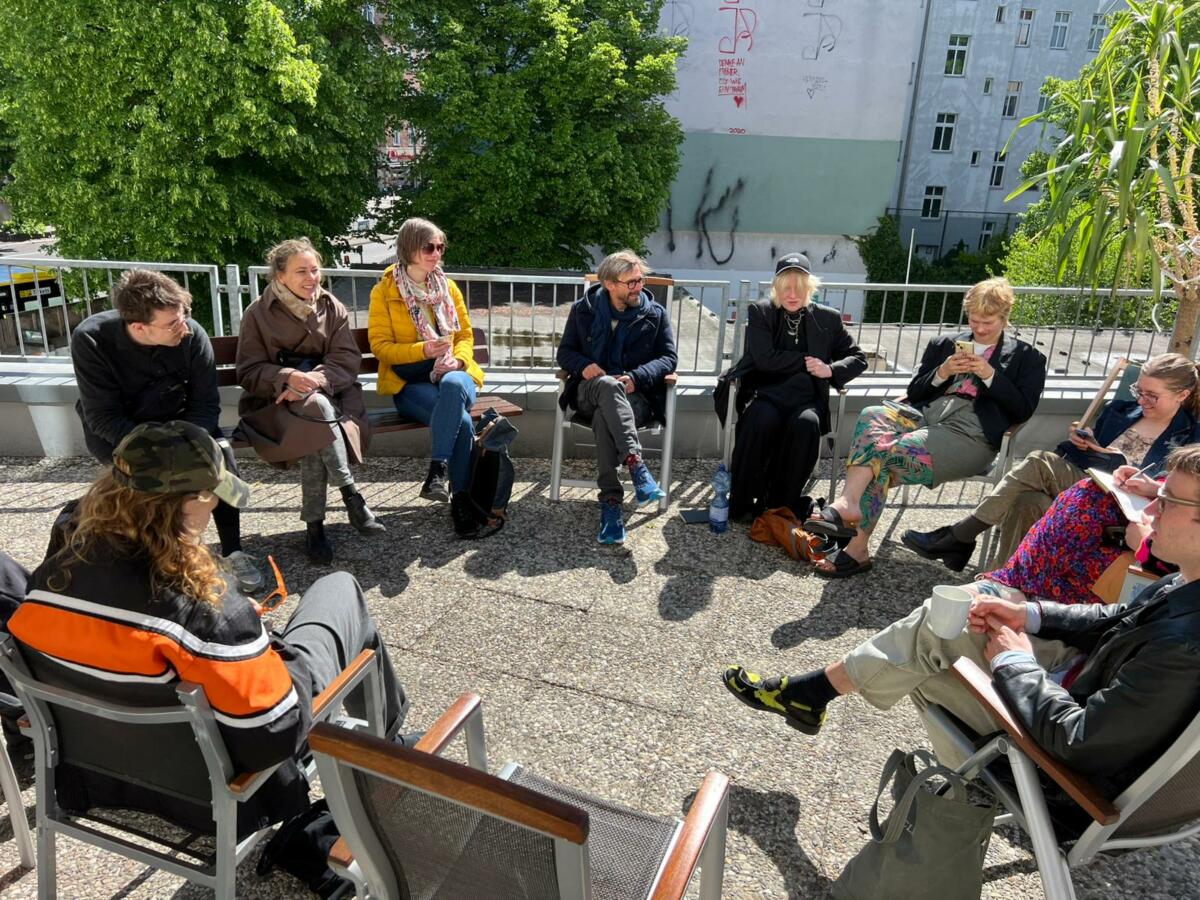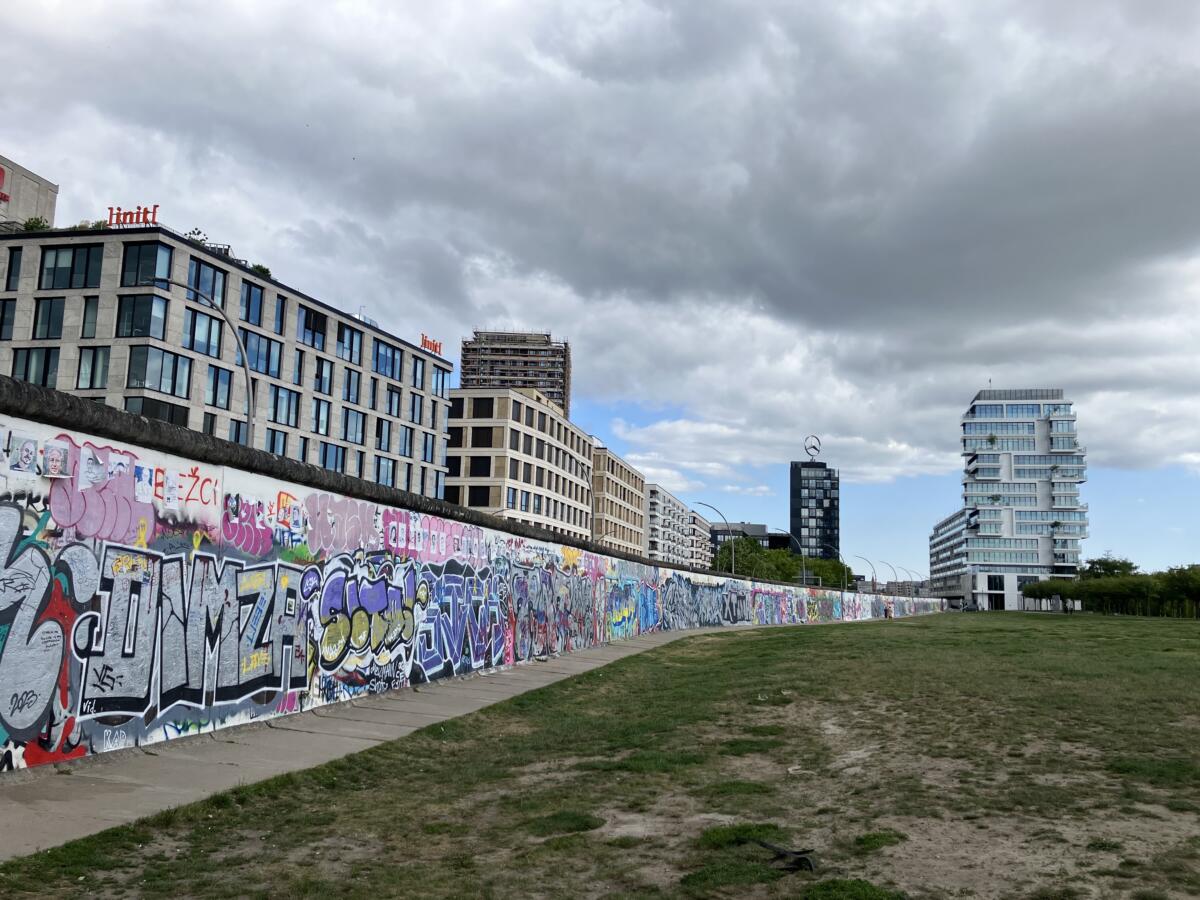Berlin Theatertreffen Course – A Fast Track to the Hotspot of German Theatre
Student ambassador Anna Korolainen Crevier shares her experiences of a week-long course on curating and spectating at Berlin Theatertreffen, a festival that brings together 10 “most remarkable” performances from Germany, Austria and Switzerland.
Theatre Academy as a Facilitator of Expanded Perspectives through International Travel
I am Anna Korolainen Crevier, a master’s student in comparative dramaturgy and performance research. As a double-degree student between Theatre Academy in Helsinki and University of Paris Nanterre, my special interest lies in European theatre and looking at contemporary theatre practice beyond borders.
Theatre Academy offers a wide range of courses that are available for anyone studying in the academy and beyond. The so-called joint studies are a wonderful opportunity to get to know other students and to be introduced to disciplines beyond one’s comfort zone and artistic expertise. Sometimes the joint studies take you abroad, which was the case with Theatertreffen course organised in Berlin in May 2025. In this blog post, I will be sharing what I experienced during the 7 days spent in Berlin.
The past four years Theatre Academy has sent a group of master’s level students to Theatertreffen to explore the current topics and styles in German theatre. The course has been led by Imanuel Schipper, a dramaturg and a lecturer at Uniarts. Schipper’s research extends on contemporary concepts of dramaturgy, digital cultures and socially relevant functions of art and he has collaborated extensively with Rimini Protokoll, an innovative performing arts company from Germany. Unfortunately, Theatertreffen course will not take place in the spring 2026, but there are plenty of other joint study options for the students who would like to travel as part of their studies. An upcoming course with a similar ethos to that of Theatertreffen is the International Campus Ruhrtriennale course in August 2025.

What’s the Fuss About Theatertreffen?
What is Berlin Theatertreffen, then? Throughout my theatre studies and career, I have heard a fair amount of gossip about Theatertreffen, but to be completely honest, before this trip I didn’t quite know what the festival was about. I imagined crowded streets of Berlin with red carpets being rolled out left and right and food stalls being constructed to feed the hungry theatre crowds. The reality was quite different. The festival is a concise and carefully curated event that exists as a part of Berliner Festspiele, a larger organisation featuring festivals and events of theatre, music, visual arts and public talks.
Theatertreffen has its history in the divided Germany and it may be due to the logistic conditions in its birth that it has stayed so compact to this day. The festival was founded in 1964 and its main concept is still the same that it used to be more than sixty years ago: to choose ten most remarkable performances from Germany, Austria and Switzerland and to invite them to perform in Berlin over a period of two weeks. The festival created a meeting point for German-speaking theatre professionals, and it was seen as a way to give the people living in West Berlin an opportunity to see theatre created elsewhere in Germany, as the city was situated in the middle of DDR and cut in half by the Berlin Wall. I could imagine that bringing only 10 performances in the city behind the Iron Curtain was a more manageable task during the cold war than organising a large scale festival with open access for anyone to perform.
Today, Theatertreffen hasn’t grown in terms of the amount of performances, but it has become popular amongst theatre professionals all around the world. As German theatre and the country’s funding structures have a good reputation, many artists from abroad come to Berlin to see contemporary German theatre as reference to their own work. The selection of the Thetertreffen performances happens through a year-long spectating and curating process where seven jurors invited by the festival director travel through German-speaking Europe to watch performances and to debate on which performances should be regarded as the most remarkable each year. Heated debates take place in and outside of the festival structure as to what are the parameters of remarkability. As our group discussed with Janis El-Bira, a jury member between 2023–2025, remarkability can never be an objective description and it is worth thinking, how varied are the backgrounds of the jury members. The power of the jurors is immense, as they get to decide who will be in the limelight of German and international theatre each year. However, as Nora Hertlein-Hull, the director of Theatertreffen pointed out, it is at times hard to find jury members of varied backgrounds, as the jurors need to be professional theatre critics and that is an endangered profession in our times shadowed by cuts on arts and journalism. The few full-time theatre critics that are left in the German speaking world, often come from priviliged backgrounds and have built their career decades ago.
Something that has stayed inseparable from Theatertreffen almost since the very beginning, is International Forum, which celebrates it’s 60th anniversary in 2025. International Forum is a scholarship program, which collects emerging artists from all over the world to train and watch theatre together, exchange ideas and refine their practice. Around half of the participants come from German-speaking countries and half are chosen internationally through an open call sent out by Goethe institutes around the world. If you are interested in applying, contact your closest Goethe institute for more details. Our Uniarts group had the opportunity to meet the participants and the facilitators of the international campus at Ufer Studios in Wedding, North Berlin, and to join their creative morning routine. We also met the co-directors of the Forum, dramaturgs Aljoscha Bergrich and Sima Djabar Zadegan who detailed to us how the International Forum has grown and become an intrinsic part of Theatertreffen. German-speaking alumni of the International Forum were this year in charge of giving the beginning presentation of each after talk, and some of the international alumni were invited to take part in the framing programme of the festival.
Another important event related to Theatertreffen has historically been Stückemarkt, a festival for German-language new writing and later of devised and site-specific performances. Unfortunately, the festival has stopped existing in 2022 and this year it was replaced by a stripped-down afternoon of staged reading called Text, Tisch, Wasserglas.

10 Most Remarkable Performances
The ten most remarkable performances this year were:
- “Bernarda Albas Haus” directed by Kate Mitchell. The text was Alice Birch’s recent adaptation of Gael Garcia Lorca’s eponymous play from 1936. The performance was invited from Deutsches SchauSpielHaus in Hamburg and discusses oppression, patriarchy and when love tuns into violence.
- “ja nichts is ok” by René Pollesch and Fabian Hinrichs from Volksbühne in Berlin. This monologue performance explores the current state of the world through one actor portraying all flatmates of one Berlin flatshare. The performance has a tragic reputation, as its co-writer René Pollesch died last year, leaving Fabian Hinrichs to carry on with the performance alone.
- “Blutbuch”, an adaptation of Kim de l’Horizon’s eponymous book directed by Jan Friedrich and created in Theater Magdeburg. This post-dramatic performance discusses growing up as a non-binary person in rural Switzerland, in relation to the writer’s matriarchal family tree. It plays with language, as the writer claims to have needed to create a language of their own in order to truthfully convey their experience.
- “Die Maschine oder: Über alle Gipfeln ist Ruh”, directed by Anita Vulesica. This absurd and playful performance is based on a radio play by Georges Perec from 1968, which imagines a machine-led deconstruction of Johann Wolfgang Goethe’s poem Wandere’s Nightsong II. Like Bernarda Albas Haus, the performance was invited from SchauSpielHaus Hamburg.
- “[EOL.]”, directed by Victoria Halper and Kai Krösche, created as a coproduction between DARUM and brut Wien. The virtual reality experience pushes the spectators into acting out and making difficult ethical choices.
- “SANCTA” by Florentina Holzinger. The provocative performance is based on “Sancta Susanna”, an opera by Paul Hindemith exploring sexual awakening of a nun. Holzinger takes the topic on another level, mixing religious symbols with sexuality and violence in search for transgression. The performance was co-produced by Spirit, neon lobster, Mecklenburgisches Staatstheater Schwerin, Staatsoper Stuttgart and in co-production with Wiener Festwochen | Freie Republik Wien, Volksbühne am Rosa-Luxemburg-Platz Berlin with Komische Oper Berlin as well as Opera Ballet Vlaanderen, Julidans, Theater Rotterdam
- “Die Gewehre der Frau Carrar / Würgendes Blei” directed by Luise Voigt. A performance combining Bertolt Brecht’s play with a piece of poetic new writing speaks of pacifism and has become topical in the war-driven times we are living in. The performance was invited from Residenztheater / Bayerisches Staatsschauspiel in Munich.
- “Unser Deutschlandmärchen” directed by Hakan Savas Mican builds bridges between a Turkish migrant worker mother and her artist son, using musicality as one of its main motives. The performance was created in Maxim Gorki theatre in Berlin.
- “Kontakthof – Echoes of ‘78”, choreographed by Pina Bausch and Meryl Tankard. This dance performance combines the classic Pina Bausch work with documentary film material, inviting the original dancers of the performance to dance with their younger selves. It was produced by Sadler’s Wells, Pina Bausch Foundation, Tanztheater Wuppertal Pina Bausch and co-produced by Amare (Den Haag), LAC Lugano Arte e Cultura, Festspielhaus St. Pölten, China Shanghai International Arts Festival.
- ”Double Serpent” directed by Ersan Mondtag explores the tipping point when sexual preferences turn into violence, entangled with a family trauma. The thriller was created in Hessisches Staatstheater in Wiesbaden.
Our group had tickets to four Theatertreffen performances: “Bernarda Albas Haus”, “Blutbuch”, “Die Maschine oder: Über alle Gipfeln ist Ruh” and “Die Gewehre der Frau Carrar / Würgendes Blei”. Some students got tickets to the extremely popular “SANCTA”, after queueing online multiple times per day. In addition to the festival’s program, two interesting performances were curated for us: “Ursonate [Wir spielen, bis uns der Tod abholt], a dadaist opera directed by Claudia Bauer, written by Kurt Schwitters and composed by Peer Baierlein. It was performed in Deutsches Theater and starred by Anita Vulesica, the director of one of the festival’s performances. The other performance was ”Die große Klassenrevue” directed by musician Christiane Rösinger. The performance was an hommage to Erwin Piscator’s proletarian revue created more than hundred years ago. The joyful musical performance was performed in HAU, the centre of independent theatre in Berlin.

Curated Experience of Pain, Violence and the Crumbling Structures
The performances were usually followed by an after talk organised by the festival, which was sometimes translated in English. Our group did also gather each morning to discuss and analyse the previous night’s performance through exercises facilitated Schipper. He provided us with different perspectives to the performances and the questions served as a way to stretch our minds to think and feel beyond our own taste. We were challenged to think about the social context of each performance we saw, to reflect what art movements the performances were dialoguing with and stepping into the shoes of different imaginary spectators.
The bleak state of the world could clearly be seen in the curating choices of the Theatertreffen jury: fascism was the backdrop for two of the classic plays programmed to the festival: Lorca and Brecht’s stories of mothers dealing with their need to protect their children from the horrors of the world. The performances which I didn’t see, seemed to deal with the desperation with the current state of the world. However, some joyful glimpses of tearing down old structures were included. The deconstructed Goethe poem in a full-length performance on a big stage was full of joy and fun and made me think how through nudging our minds to think differently, a whole new world can be built.
When in Berlin, Is There Life Beyond Theatre?
Even though the theatre outings and our debrief discussions took most of the trip, we still managed to enjoy some other aspects of Berlin. We visited Yoko Ono’s retrospective exhibition at Gropius Bau museum, which is also part of the Berliner Festspiele organism. Everyone had a chance to wander around their favourite places in Berlin and get to know Neuköln and Kreutzberg areas, where our hostel was situated. A memorable group activity was walking for hours through the city, with Schipper giving us insights to the landmarks of Berlin’s colourful history.
The course was a wonderful dive into the German theatre culture, a lovely week under the Central European sun and an inspiring opportunity to share artistic thoughts and ideas with old and new colleagues.

Life of an art student
In this blog, Uniarts Helsinki students share their experiences as art students from different academies and perspectives, in their own words. If you want to learn even more regarding studying and student life in Uniarts and Helsinki, you can ask directly from our student ambassadors.
Latest posts
Follow blog